Gardener Plumstead: Your Comprehensive Guide to a Thriving Garden
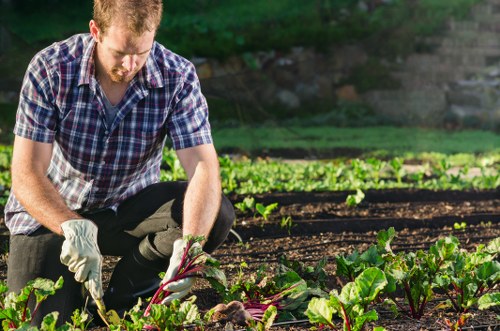
Maintaining a beautiful garden in Plumstead can be a rewarding yet challenging endeavor. Whether you're a seasoned gardener or just starting out, understanding the unique climate and soil conditions of Plumstead is crucial for your garden's success.
Plumstead, located in southeast London, offers a mix of urban and suburban environments, providing gardeners with diverse opportunities to cultivate a variety of plants. From vibrant flower beds to lush vegetable gardens, the potential is endless.
In this guide, we will explore the essential aspects of gardening in Plumstead, including tips on soil preparation, plant selection, and seasonal care. We'll also highlight the best local resources to help you achieve a thriving garden.
Understanding Plumstead’s Climate
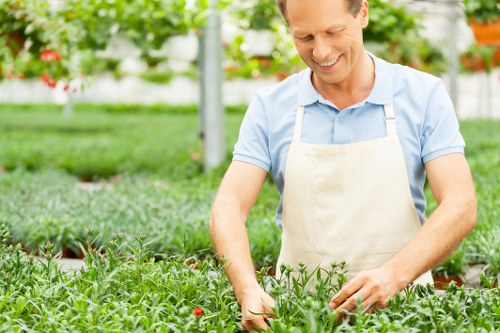
Plumstead experiences a temperate maritime climate, characterized by mild winters and warm summers. This climate is generally favorable for a wide range of plants, but it's important to be aware of specific conditions that can affect your garden.
Rainfall in Plumstead is evenly distributed throughout the year, ensuring that your plants receive adequate moisture. However, occasional dry spells during the summer may require supplemental watering to keep your garden healthy.
Wind can also play a significant role in your gardening efforts. Strong gusts may damage delicate plants, so selecting wind-resistant varieties and providing suitable windbreaks can help protect your garden.
Soil Preparation and Maintenance
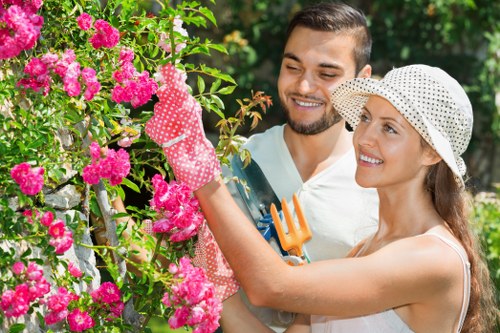
The foundation of a successful garden lies in well-prepared soil. Plumstead's soil tends to be a mix of clay and sand, which can affect drainage and nutrient availability.
Before planting, it's essential to test your soil's pH levels and nutrient content. Adding organic matter such as compost or well-rotted manure can improve soil structure, enhance fertility, and promote healthy plant growth.
Regular soil maintenance, including mulching and periodic fertilization, will ensure that your garden remains vibrant throughout the seasons. Mulch helps retain moisture, suppress weeds, and regulate soil temperature.
Choosing the Right Plants
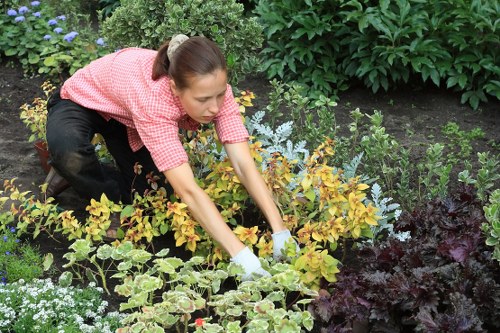
Selecting plants that are well-suited to Plumstead’s climate and soil conditions is key to a flourishing garden. Native plants generally require less maintenance and are more resistant to local pests and diseases.
Flowering plants such as roses, tulips, and lavender thrive in Plumstead’s climate. For those interested in vegetable gardening, tomatoes, lettuce, and carrots are excellent choices.
Herbs like basil, mint, and rosemary can add both beauty and utility to your garden. These plants not only enhance your outdoor space but also provide fresh ingredients for your kitchen.
Seasonal Gardening Tips
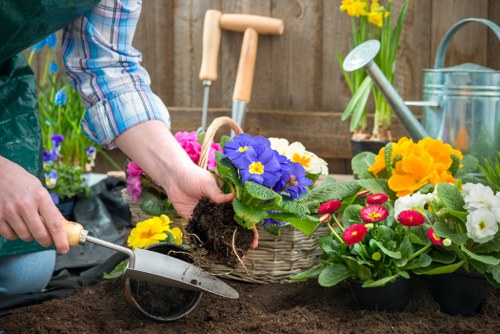
Understanding the seasonal changes in Plumstead is vital for effective garden management. Each season presents unique challenges and opportunities for your garden.
Spring: This is the perfect time to plant new seeds and prepare your garden beds. Ensure that plants are well-watered and protected from late frosts.
Summer: Regular watering and mulching are essential to keep plants healthy during the hot months. Prune overgrown plants to improve air circulation.
Autumn: Harvest your crops and prepare your garden for the cooler months. Compost fallen leaves and plant bulbs for spring blooms.
Winter: Protect your plants from frost by using covers or moving potted plants indoors. This is also a good time to plan and design your garden for the upcoming year.
Local Resources for Gardeners in Plumstead
Plumstead offers a variety of local resources to support gardeners. From nurseries and garden centers to community gardens and workshops, there's ample support for both novice and experienced gardeners.
Visit local garden centers to find a wide selection of plants, tools, and gardening supplies. Many centers also offer expert advice and workshops to help you improve your gardening skills.
Community gardens in Plumstead provide opportunities to collaborate with other gardeners, share resources, and gain inspiration for your own garden. These spaces are also great for learning about sustainable gardening practices.
Nearby Areas to Plumstead for Garden Enthusiasts
While Plumstead itself is a hub for gardening, exploring nearby areas can offer additional opportunities and inspiration. Here are some of the closest areas to Plumstead that are perfect for gardeners:
- Woolwich: Just a short distance from Plumstead, Woolwich boasts several public gardens and green spaces that are ideal for leisurely walks and plant inspiration.
- Greenwich: Known for its beautiful parks and historical gardens, Greenwich is a must-visit for any gardening enthusiast.
- Kidbrooke: With its blend of residential and green spaces, Kidbrooke offers ample spots for gardening activities and plant shopping.
- Park Royal: This area is home to large parks and botanical gardens, providing a tranquil environment for garden planning and relaxation.
- Blackheath: Famous for its expansive heathland, Blackheath is perfect for those who love open spaces and diverse plant life.
- Eltham: Eltham has several community gardens and nurseries that cater to the needs of local gardeners.
- Lewisham: Offering a mix of urban and suburban gardening opportunities, Lewisham is another nearby area worth exploring.
- Deptford: Deptford's vibrant community gardens and plant markets make it a great spot for gardening supplies and advice.
- Charlton: With its picturesque parks and gardens, Charlton is ideal for inspiration and gardening projects.
- Blackwall: Blackwall's green spaces and gardening centers provide everything you need for a thriving garden.
Common Gardening Challenges in Plumstead
Gardening in Plumstead comes with its own set of challenges. Being aware of these issues can help you better prepare and maintain a healthy garden.
- Pests and Diseases: Common pests like slugs, snails, and aphids can damage your plants. Implementing natural pest control methods can keep infestations in check.
- Soil Drainage: Heavy clay soils can lead to poor drainage. Incorporating organic matter and using raised beds can improve soil structure.
- Weather Extremes: Unexpected frosts or heatwaves can stress your plants. Using protective covers and choosing resilient plant varieties can mitigate these effects.
- Space Limitations: Urban gardening often means limited space. Opting for container gardening or vertical gardens can maximize your available area.
Tips for Sustainable Gardening
Sustainability is becoming increasingly important in gardening. Implementing eco-friendly practices not only benefits the environment but also enhances the health of your garden.
- Composting: Recycling kitchen scraps and garden waste into compost enriches the soil and reduces landfill waste.
- Rainwater Harvesting: Collecting rainwater for irrigation conserves water and reduces your utility bills.
- Native Plants: Using native species supports local biodiversity and requires less maintenance.
- Organic Gardening: Avoiding synthetic fertilizers and pesticides promotes a healthier ecosystem in your garden.
- Mulching: Mulch helps retain soil moisture, suppresses weeds, and adds organic matter to the soil as it decomposes.
Gardening Tools and Equipment
Having the right tools can make gardening in Plumstead much easier and more enjoyable. Here's a list of essential gardening tools every gardener should have:
- Hand Trowel: Perfect for planting, transplanting, and digging small holes.
- Pruning Shears: Essential for trimming and shaping plants.
- Garden Fork: Ideal for aerating soil and removing weeds.
- Watering Can or Hose: Ensures your plants receive adequate moisture.
- Garden Gloves: Protect your hands from thorns, dirt, and pests.
- Wheelbarrow: Useful for transporting soil, plants, and other materials.
- Rake: Helps in leveling soil and removing debris.
- Hoe: Great for cultivating soil and controlling weeds.
- Garden Kneeler: Provides comfort while working on low areas of your garden.
Creating a Garden Plan
A well-thought-out garden plan is the backbone of a successful gardening project. Planning helps you organize your space, choose the right plants, and manage your time effectively.
- Assess Your Space: Determine the size, sunlight exposure, and soil type of your garden area.
- Set Goals: Decide whether you want a flower garden, vegetable patch, or a mix of both.
- Choose Plants: Select plants that thrive in Plumstead’s climate and complement each other in terms of color and height.
- Design Layout: Sketch a layout that maximizes space and ensures each plant has enough room to grow.
- Maintenance Schedule: Create a timetable for watering, fertilizing, pruning, and other gardening tasks.
Conclusion
Gardening in Plumstead offers a unique blend of challenges and rewards. By understanding the local climate, preparing your soil properly, choosing the right plants, and utilizing sustainable practices, you can create a thriving garden that enhances your living space.
Remember to take advantage of local resources and connect with fellow gardeners in nearby areas to share tips and gain inspiration. With dedication and care, your Plumstead garden can become a beautiful and sustainable oasis.
Frequently Asked Questions
1. What are the best plants for a Plumstead garden?
Native plants like lavender, roses, and tulips thrive well in Plumstead's climate. Additionally, vegetables such as tomatoes and herbs like basil are excellent choices.
2. How can I improve soil drainage in my garden?
Incorporate organic matter like compost or well-rotted manure into the soil. Using raised beds can also help improve drainage in heavy clay soils.
3. What is the best time to plant in Plumstead?
Spring is ideal for planting new seeds and preparing garden beds. However, with proper care, many plants can be successfully planted throughout the year.
4. How do I protect my plants from pests naturally?
Use natural pest control methods such as introducing beneficial insects, using organic sprays, and maintaining healthy soil to prevent pest infestations.
5. Where can I find gardening resources in Plumstead?
Local garden centers, community gardens, and online forums are great resources. Additionally, nearby areas like Woolwich and Greenwich offer various gardening workshops and nurseries.